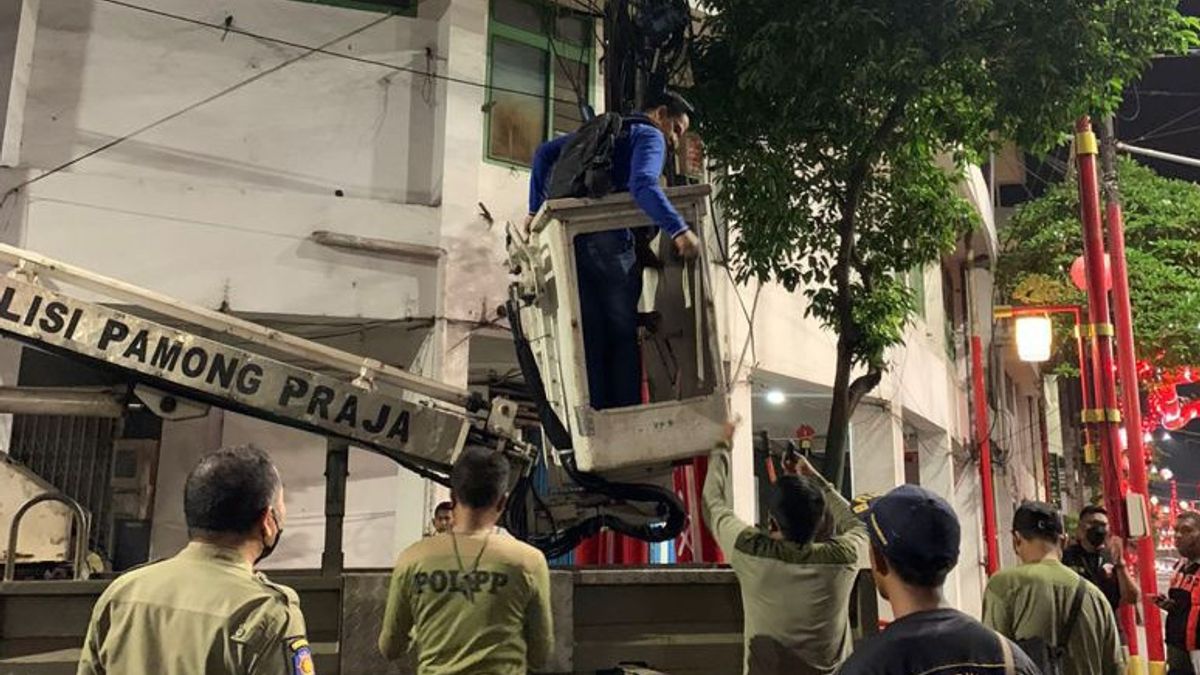SURABAYA - The Surabaya City Government is cracking down on the fraudulent provider utility network, late paying rent and whose licensing period has expired in seven main areas of the City of Heroes, East Java, from February to December 2022.
Head of the Surabaya City Water Resources and Highways Agency (DSDABM) Lilik Arijanto said the seven main areas included Jalan Pemuda, Jalan Panglima Sudirman, Jalan Basuki Rahmat, Jalan Embong Malang, Jalan Praban, Jalan Tunjungan, and Jalan Blauran.
"The crackdown on the utility network was carried out by the Utilities Network Development Coordination Team (KPJU). It consists of DSDABM together with the Satpol PP ranks and related Regional Apparatus (PD) within the city government," Lilik said, quoted from Antara, Sunday, January 15.
Lilik said, within a year there are at least 10-15 fraudulent provider utilities that are put in order on each of the main routes. On average, the bulging provider utility does not have a permit.
Controlling, continued Lilik, DSDABM first checked at the seven points. When it is found that there are unlicensed provider utilities, the city government will provide a warning letter.
"By giving a warning letter one. If it is not followed up, of course we will send a second and even a third warning letter," said Lilik.
If there is no further response from the relevant provider, Lilik continued, then the Surabaya City DSDABM and Satpol PP immediately call the owner of the related utility. After being summoned, the owner of the utility is then invited to mediate, regarding the installation without a permit or whose lease period has ended.
"If there is no further progress, such as permits and payments for the installation of utilities from the provider, we will strictly regulate them, or they can dismantle them themselves," he said.
Lilik appealed to every provider owner to be orderly and licensed first, when installing utilities in the road land area or assets belonging to the city government. If you do not do the permit, it will have an impact on the loss of Regional Original Income (PAD). Not only that, but bulging utilities also have an impact on the results of an annual audit from the Supreme Audit Agency (BPK).
In accordance with Regional Regulation Number 5 of 2017 and Mayor Regulation Number 49 of 2015, there are two conditions that must be met when installing a utility network, including a permit for implementing and placement of utility network development.
"Before the utility network is built on land owned by the city government, it must have a land utilization permit. So, there must be a legal relationship for the requirements, then the KPJU team will study whether the installation is carried out in the city government's assets or not," he said.
If the utility network is apparently built in the city government's asset area, he continued, the value of land utilization leases will be calculated through third parties.
"Later, DSDABM will coordinate with the Public Appraisal Service Office (KJPP) to calculate the rental value. So it is not the city government that calculates the rental value, but the third party who has obtained a license from the Ministry of Finance," he said.
After the results of the rental assessment from KJPP are determined, it will be submitted to the owner of the utility network, regarding the nominal rental fee. "At the same time we issue a permit for the implementation of the construction and the lease period agreement," said Lilik.
The English, Chinese, Japanese, Arabic, and French versions are automatically generated by the AI. So there may still be inaccuracies in translating, please always see Indonesian as our main language. (system supported by DigitalSiber.id)








